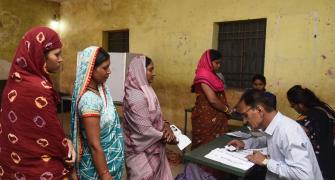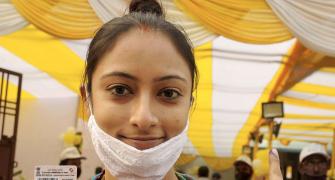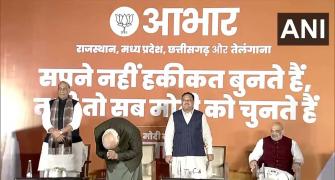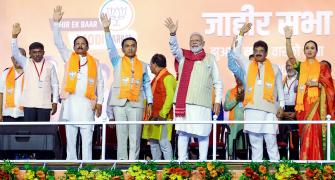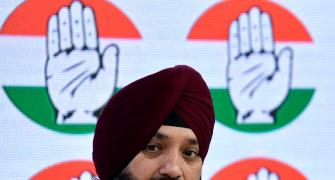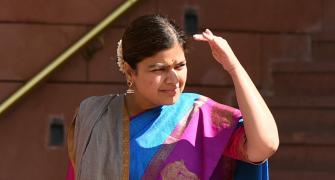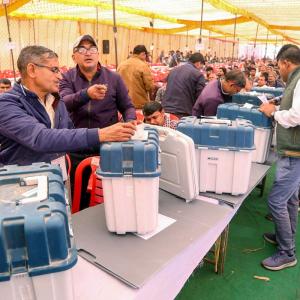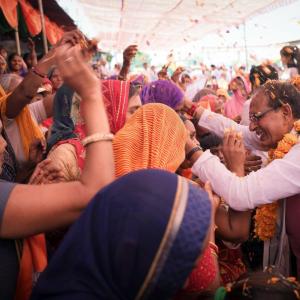More than ever before, women voters can make or mar a political party's electoral fortunes.

In the recent past, several political leaders, from Prime Minister Narendra Modi and Congress leader Rahul Gandhi to then Madhya Pradesh chief minister Shivraj Singh Chouhan, Karnataka CM Siddaramaiah and Delhi CM Arvind Kejriwal have talked up their women-centric schemes.
The governments they or their parties lead have indeed implemented schemes with women as primary beneficiaries, but they are no trailblazers.
The trailblazer's crown sits firmly on the head of J Jayalalithaa, widely recognised in Tamil Nadu as the mother of welfare schemes.
During her first stint as the Tamil Nadu chief minister from 1991 to 1996, the only woman chief minister across the country, and in her subsequent tenures, Jayalalithaa provided the template for measures to empower women, beginning with the Cradle Baby scheme to discourage female infanticide.
It allowed women to anonymously hand over their babies for the government to raise or put up for adoption.
She opened women-run police stations, reserved a third of police jobs for women, and in later years introduced the thalikku thangam thittam, or gold for marriage, scheme.
She also distributed laptops and mobile phones to women.
Inspired by the Tamil Nadu model, Odisha's Naveen Patnaik in 2001, Nitish Kumar in Bihar and MP's Chouhan, the latter two from 2005 onwards, launched pro-women policies that engendered a steadfast electoral loyalty among women.
Modi, first in Gujarat and then at the Centre, with Ujjwala and Clean India campaigns, Mamata Banerjee in Bengal, and others have taken the baton.
Increasingly, political parties have promised cash transfers to homemakers, besides free bus travel, subsidised cooking gas and kitchen equipment, and given bicycles and scooties to female students.
On September 28, the President of India granted her assent to the Women's Reservation Bill, which reserves 33 per cent of the seats for women in the Lok Sabha and state legislative Assemblies.
Nari shakti
More than ever before, women voters can make or mar a political party's electoral fortunes.
Across India, reservation of seats for women in Panchayati Raj Institutions and urban local bodies, better literacy, and the Election Commission's efforts to have separate queues for women and mandatory women polling officials, have narrowed the gender gap in voting to the extent that in several states women turnout is higher than men (see Outdoing the men).
Also, the improved women voter turnout addressed their representation.
Pradeep Gupta, founder and chairman and managing director of Axis My India, which predicted the Karnataka and Madhya Pradesh assembly polls accurately, attributes the Congress's and Bhartiya Janata Party's wins in these two states to significant support from women.
"India is a patriarchal society; whatever women earn goes to the male member of the family, which is where politicians realised that the most deprived member of a family is its women and tailored the schemes so that the beneficiaries are women," Gupta told Business Standard.
The market researcher says a woman's "chief wage earner" is no longer her father or husband, but the government of the day.
The government transferring the money into their bank accounts, and digital payments such as UPI have helped.
"That is where women are meticulous in making their electoral choices," Gupta said, attributing the post-2014 support of women for the BJP to the Modi government's women-centric schemes.
On December 3, 2023, at the BJP headquarters, Modi acknowledged this support in the three Hindi heartland states.
In the recently concluded Madhya Pradesh assembly polls, the India Today-Axis exit poll said support from women 'turned the tide in favour of the BJP", crediting Chouhan's "bond with women voters" because of his government's 21 women-centric social welfare schemes for the last 18 years, from Gaon ki Beti Yojana in 2005 to Ladli Laxmi in 2007 and now Ladli Behna, through which 13.1 million women received Rs 1,250 in their accounts on the 10th of every month.
The Axis exit poll said half of all women voted for the BJP, compared to 40 per cent for the Congress.
In May, the exit poll had found that the Congress, thanks to its pro-women schemes, bagged 11 per cent more women votes than the BJP in Karnataka.
In the Telangana assembly polls, Congress leader A Revanth Reddy promised to herald an 'Indiramma Rajyam', stoking the fond memories that elderly voters, especially women, have of Indira Gandhi contesting from Medak in 1980.
As it turns out...
On March 8, 2001, the Patnaik government launched its Mission Shakti programme in Odisha to support women's self-help groups, providing credit and market linkages.
These groups now number 600,000, with 7 million members, and the government has disbursed nearly Rs 6,000 crore
The electoral support from Odisha's women could soon make Patnaik the longest-serving chief minister in India.
Voter turnouts, especially of women, have improved in Odisha -- from 54.25 per cent for women and 63.63 per cent for men in the 2000 assembly poll to 74.08 per cent for women and 71.82 per cent for men in 2019.
However, the number of female legislators remains stagnant in the state at 13 in 2019, the same number that won in 2000.
The trend of promising cash transfers to women picked up after the 2021 assembly polls.
In Bengal, Mamata Banerjee promised cash transfers of Rs 500 to Rs 1,000, getting 50 per cent women votes compared to 37 per cent of men in the 2021 assembly polls.
In Tamil Nadu in 2021, the Dravida Munnetra Kazhagam promised Rs 1,000 monthly allowance for women and its rival All India Anna Dravida Munnetra Kazhagam assured Rs 1,500.
In Assam the same year, the BJP promised the Orunodoi scheme in 2021, announcing a Rs 800 allowance to women.
According to Lokniti-CSDS findings, in the 2009 Lok Sabha polls, 43 per cent of women voters said they made an independent voting decision, which increased to 50 per cent in 2014 and 77 per cent in 2019.
None of these, experts say, is evidence that women vote en bloc.
Issues of caste, class, economy, region, religion, and ethnicity determine their voting choices, as they do for men.
Contours of the constituency
Usha Thakkar, a retired professor who headed the political science department at Mumbai's SNDT Women's University, said the increased number of women turning up for voting by itself cannot be a reason to believe that a women's constituency, or vote bank, has evolved.
For most women, going out to vote is a break from the routine of their daily life, and akin to a festival.
"Voting is the beginning of the assimilation in the policy system, and the process has started, but the contours of women's constituency are yet to emerge clearly," Thakkar said, adding that women continue to remain at the periphery of electoral politics.
Women activists like Thakkar term cash transfers and other pro-women schemes as "carrots of promises for women voters in lieu of real representation".
They point out that reservations work, ensuring better representation for scheduled castes and scheduled tribes women in local bodies.
Of the 4,300 assembly seats, 650 are reserved for SCs and 300 for STs.
According to a 2019 study by F R Jensenius, in assembly elections held between 2004 and 2014, SC men constituted 21.7 per cent of all male candidates, while SC women were 26.3 per cent of all female candidates.
From the 1990s, SC/ST women have fared better than general category women in terms of party nominations and winning seats.
Feature Presentation: Aslam Hunani/Rediff.com


